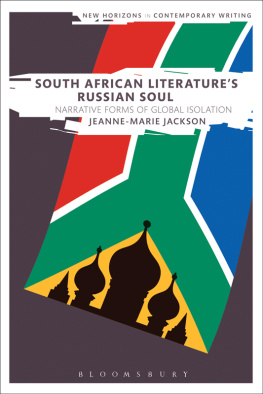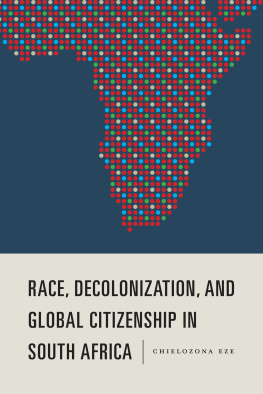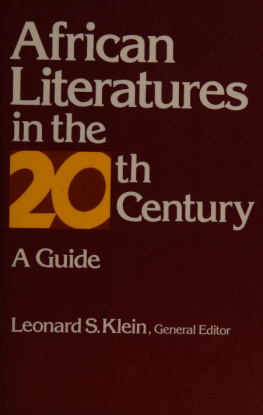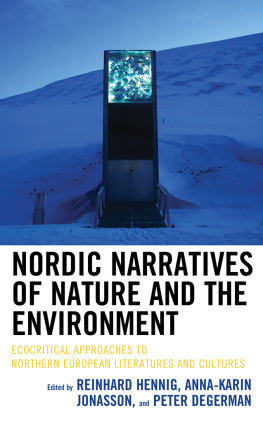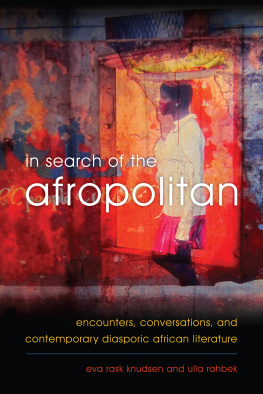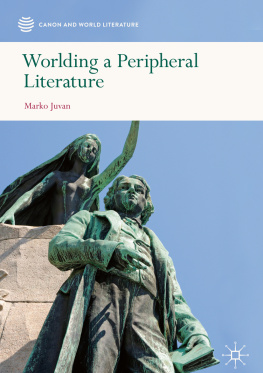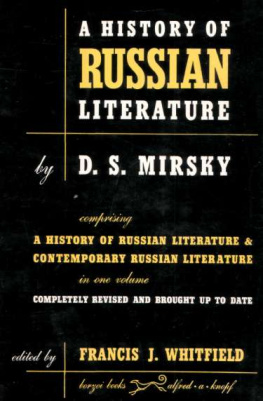South African Literatures
Russian Soul
New Horizons in Contemporary Writing
In the wake of unprecedented technological and social change, contemporary literature has evolved a dazzling array of new forms that traditional modes and terms of literary criticism have struggled to keep up with. New Horizons in Contemporary Writing presents cutting-edge scholarship that provides new insights into this unique period of creative and critical transformation.
Series Editors:
Peter Boxall and Bryan Cheyette
Volumes in the series:
Wanderwords: Language Migration in American Literature
by Maria Lauret
Transatlantic Fictions of 9/11 and the War on Terror
by Susana Arajo
Life Lines: Writing Transcultural Adoption
by John McLeod
South African Literatures
Russian Soul
Narrative Forms of Global Isolation
Jeanne-Marie Jackson
Bloomsbury Academic
An imprint of Bloomsbury Publishing Plc

For Leon, in both winters
The dissertation from which this book emerged was the product of six years in the Comparative Literature Department at Yale, for which I am increasingly grateful. I would thus like first to thank the many people who helped me bring the ideas presented here to their (first) fruition. In addition to my advisors, Katerina Clark and Justin Neuman, I had memorable seminar experiences with Peter Brooks, Paul Fry, and Haun Saussy. Pericles Lewis and Katie Trumpener played essential roles in my and many others time in the program, and Ilya Kliger will never know how important he has been as a model of intellectual virtue. I am grateful to the Directed Independent Language Study program, along with Sandra Sanneh and Annie Antonites, for enabling me to learn Afrikaans while I lived in New Haven.
Thanks are due also to the close Yale peers I relied on as a graduate student and during our first years out of the gate, including Maria Taroutina, Chris Grobe, Michaela Bronstein, Anne-Marie McManus, Carolyn Sinsky, Stefan Esposito, and Nathan Suhr-Sytsma. James Maguire read every chapter in draft form.
Immense gratitude is owed to Carol Ueland at Drew University, who saw me through an undergraduate Russian major sparing no opportunity or effort.
In Cape Town, close friends Ashraf Jamal and Henrietta Rose-Innes have provided invaluable insight into what it means to write novels, rather than only critique them. Numerous other South African friends and colleagues have been thoughtful readers and interlocutors, as have my Russian host families and teachers over the years.
To my colleagues in the English Department at Johns HopkinsEric Sundquist, Sharon Cameron, Mark Thompson, Chris Nealon, Sharon Achinstein, Drew Daniel, Jesse Rosenthal, and Jared Hickmanthank you for the warm welcome and always-challenging academic home. I am also grateful to Studies in the Novel, English Studies in Africa, Safundi, and JNT: Journal of Narrative Theory for permission to reprint versions of previously published work.
Thanks are due, also, to Mark Richardson and David Avital at Bloomsbury, as well as the editors of its timely New Horizons in Contemporary Writing series: Stephen Burn, Peter Boxall, and Bryan Cheyette.
Finally, I am indebted to my familyEllen, Ralph, my sister Erin, and my unusually supportive grandparentsfor never taking me too seriously. And to my husband Leon de Kock, whose voice in the field of South African writing helped get me started on this path: jy is regtig die kool wat die sous werd is.
In South Africa, as in Russia, life may be wretched; but how the brave spirit leaps to respond!
J.M. Coetzee, Diary of a Bad Year (2007)
In 1825, the Russian Tsar Nicholas I suppressed an uprising of 3,000 army officers against his assumption of the throne, following its surprising renunciation by his brother Constantine. The members of the group in which the revolt was seeded, called simply the Decembrists in what is considered a defining event of the Russian intelligentsias formation, divided their aims across two main factions: the moderate Northerners sought a constitutional monarchy and the serfs liberation, while a more radical Southern contingent sought the end of the monarchy and mass redistribution of land.
It is a story of tragic proportions, chronicled most famously in the poetry of Alexander Pushkin, the so-called Father of Russian Literature. In the background of this lofty act of rebellion, though, is a macabre fecklessness that inflects Russias legacy no less than its nobler aspects do. At the execution by hanging of five Decembrist leaders where the ropes around three of the mens necks broke, the poet Kondraty Ryleev is thought to have muttered: Unhappy country, where they dont even know how to hang you! Ryleev soon died dramatically grasping a book of Byrons verse: though tradition dictated that survivors of a botched execution were to be set free, the Tsar had just ordered more rope. Thus began Russias literary Golden Age, among the most fertile and divisive eras in world intellectual history. Given the at-once compelling and exasperating tandem of intensity and ineptitude in this brief example, one can perhaps begin to contextualize the Russian philosopher Pyotr Chadaevs remark one year later, that Russia was only a gap in the human intelligence, only an instructive example for Europe (Herzen Reader 14).
In what might seem like a jarring transition, the propensity of many of Russias notable nineteenth-century thinkers to take a despairing view of their homeland provides a clear bridge to this books South African context. What, in the end, is this monster that calls itself Russia, asks Alexander Herzen in 1850, which needs so many victims and which permits its children only the sad alternative of either losing themselves morally in a setting hostile to all that is human, or of dying at the dawn of their life? (17). J.M. CoetzeeNobel Laureate, estranged Afrikaner, and world Anglophone writer par excellencehas often described his birth nation in similarly warped terms. In his acceptance speech for the 1987 Jerusalem Prize for literature, anthologized in Doubling the Point, he remarks: The deformed and stunted relations between human beings that were created under colonialism and exacerbated under what is loosely called apartheid have their psychic representation in a deformed and stunted inner life, resulting in national writers that cannot quit a world of pathological attachments (98).
The fiery South African critic Ashraf Jamal has taken issue with Coetzees fatalism, as well as the stylistic and psychological aridity that he thinks results from it, in terms that further echo the divisions of nineteenth-century Russian intellectual life. In the parallel with which this book starts, and which ultimately saw Chadaev locked up by the Tsar in an asylum, Herzen takes issue not with the accuracy but with the spirit of Chadaevs description of Russia as an historical gap. We believe, writes Herzen, while for [Chadaev] it was enough to point a finger. We hope; for him it was enough to open the page of a journal to prove that he was right (14). In a recent interview, Jamal decries what we might, in good Russian fashion, call Coetzees spleen in terms that now seem uncannily resonant:
When Coetzee says that South Africa is as irresistible as it is unlovable he, precisely, re-enacts the procedure of fascination and loathing which largely characterises the continued psychic state of our fellow citizens. Still, just because he is accurate does not mean that the position is meritorious. My counter-view is that South Africa is as resistible as it is loveable. By this I mean that only by conceptualising the country in this way will we counter our pathological inheritance. But then, perverts that we are, we prefer to rot in our fallibility and our weakness. Which of course means that freedom is the last thing that anyone wants!
Next page
